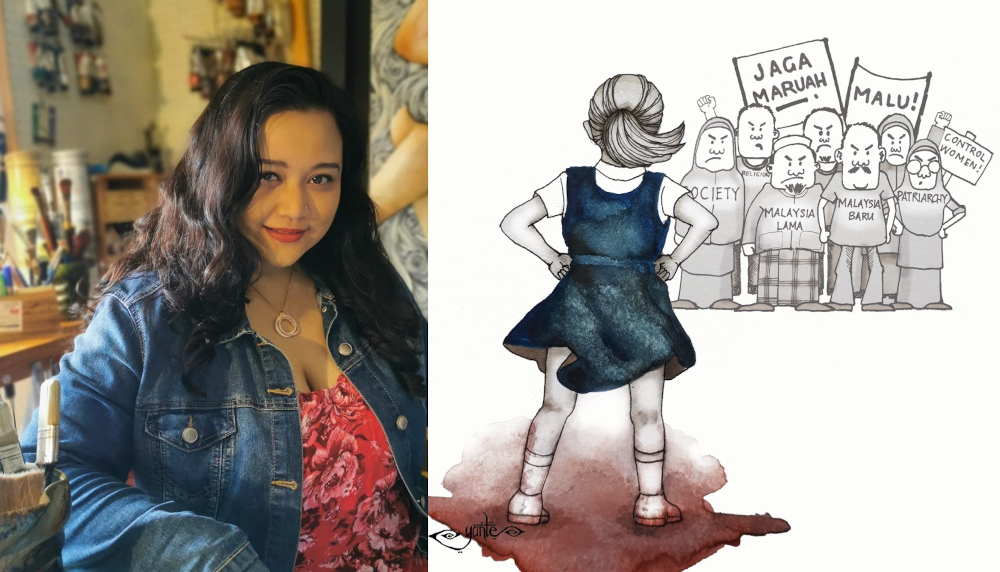PETALING JAYA, April 28 — Malaysian artist Yante Ismail’s depiction of a defiant student has hit home amidst the brewing controversy over period spot checks in local schools.
Her artwork, adapted from a piece she made in 2019, shows a girl in a blue pinafore standing with arms akimbo and what appears to be a pool of blood at her feet.
The young student stares down an angry mob carrying signs reading “shame”, “protect your dignity”, and “control women.”
Yante told Malay Mail that it’s no surprise that an art piece she made two years ago has become relevant again given that patriarchal values continue to permeate Malaysian society.
“This is a theme that arises over and over because until patriarchy is dismantled, society will continue to believe it has a right to stake a claim over a woman’s body, dictating how she should behave and what she chooses to do with her body.
“Women will continue to be seen as ornamental, or a commodity, or merely for reproductive purposes — an object,” said Yante.
“This belief is what drives the rape culture in any society.”
Yante’s work is reminiscent of the famous “Fearless Girl” statue in Manhattan, New York, which has become a symbol of female resilience in the face of gender discrimination.
This theme has been thrust back into the spotlight here in Malaysia after women opened up online last week about traumatic experiences at school involving period spot checks.
Speaking anonymously, the women revealed how they were forced to prove to teachers that they were menstruating so they could be excused from strenuous physical activities like sports or religious practices like fasting and praying.
Some recalled how teachers would grope them to check if they were wearing sanitary pads while others said they were given tissues to wipe between their legs and provide “evidence” that they were menstruating.
The accusations were disputed on Monday by Education Minister Datuk Mohd Radzi Md Jidin, who claimed that investigations into period spot checks have come up empty.
Despite this, the issue continues to make headlines and spark conversations surrounding the safety and well-being of girls at educational institutions.
Yante, who also works at an international humanitarian organisation, wants people to recognise that feminist issues such as sexual harassment and body shaming go hand-in-hand with human rights.
She added that the “institutional and societal obsession” with controlling women’s bodies has created an environment where perpetrators feel emboldened into believing they have the right to control every aspect of a woman’s existence.
“This is the belief system that needs to be dismantled — at the religious, societal, cultural, and institutional levels,” said Yante.
In a Facebook post on Monday, Yante applauded the women who spoke up about the period spot checks and gave a special mention to Ain Husniza Saiful Nizam, a student who spearheaded the hashtag #MakeSchoolASaferPlace this week after she exposed her teacher for making rape jokes in class.
Yante urged Malaysians to rethink the way they teach boys and girls about women’s bodies if they truly want to protect them from harm.
Instead of seeing female bodies as mere commodities or reproductive vessels, she emphasised the need for society to uphold a woman’s right to autonomy over her own body.
“And because (girls) will inevitably find themselves standing alone, arms akimbo, facing down a mob of politicians, enforcers of patriarchy, defenders of religion, guardians of virtue, virginity, and morality — all hell-bent on controlling her body — teach our girls to be fearless.
“And then, start right back from the beginning, and teach our boys the same thing. For that is how we protect our girls,” she wrote.






















